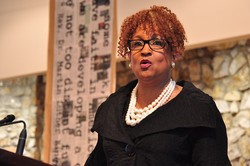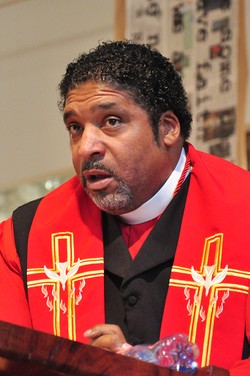For three days in the mountains of North Carolina, nearly 1,000 Presbyterians and members of other denominations reflected on the historic 1965 appearance of the Rev. Dr. Martin Luther King, Jr. at the Montreat Conference Center. In fact as many as a dozen attendees were present 50 years ago when King preached in Anderson Auditorium.
As the gathering came to a close, two ministers reminded the crowd that while great progress has been made in civil rights since King’s appearance, more needs to be done.
The Rev. William Barber II, pastor of the Greenleaf Christian Church (Disciples of Christ) in Goldsboro, N.C., and president of the North Carolina State Conference of the NAACP, said that instead of erecting monuments to Dr. King, people should take his message to state houses.
“We have to be careful how we handle prophets. We tend to love the tombs of the prophets and love them more in their death than we do in life,” he said. “Dead men make convenient heroes, they cannot rise and challenge the images we fashion. We need people who will recognize that imitation is the best form of flattery.”
Barber said prophetic dissent is the path to higher ground adding that whenever the nation has moved forward, there was be a spiritual awakening.
“It doesn’t matter what denomination it is, if the church speaks of Christ but defends the powerful and does nothing about the social forces that ravage people’s lives, then it is suspect,” Barber said. “If you want to know where God is, find the poor, find the captive, find the ones the world deems unacceptable. No other sin is more dominant than the mistreatment of the poor, women and children.”
Bishop Vashti Murphy McKenzie of the African Methodist Episcopal (AME) Church concluded the weekend gathering telling the crowd that the events of the past year have shaken America out of a fantasy land of a post racial society. She urged attendees to find non-violent ways to give voice to the “rage simmering in us.”

Bishop Vashti Murphy McKenzie —Joseph Williams
“Montreat is calling us to reconnect with the dream again. When will the dream come true?” she asked. “Must we wait for another massacre or another generation? How many innocent people must die before we lift our heads and pay attention to what’s going on?”
McKenzie said we must learn from the past generations and build on it to take on the issues facing the nation today. She referred to the violence in Ferguson, the Charleston church shootings as well as issues over open carry laws and border protection.
“Don’t live history, learn from it and stand on the shoulders that history provides,” she said. “In order to break new ground and find new answers to old problems, you will have to dig some new wells and rediscover something from the past to form your future.”
The bishop concluded her message by saying confidence is not in ourselves but in God who allows us to stretch and try new things.

